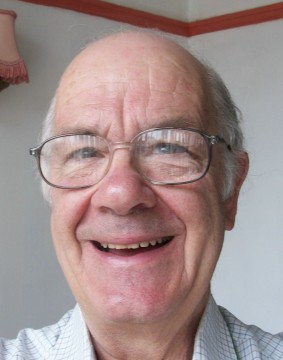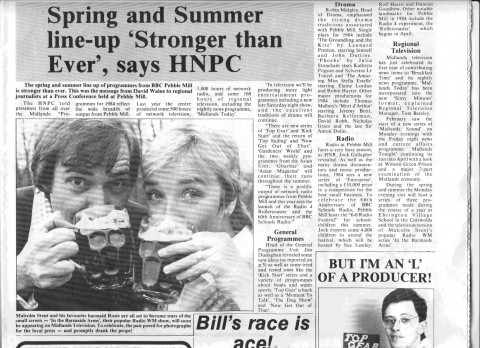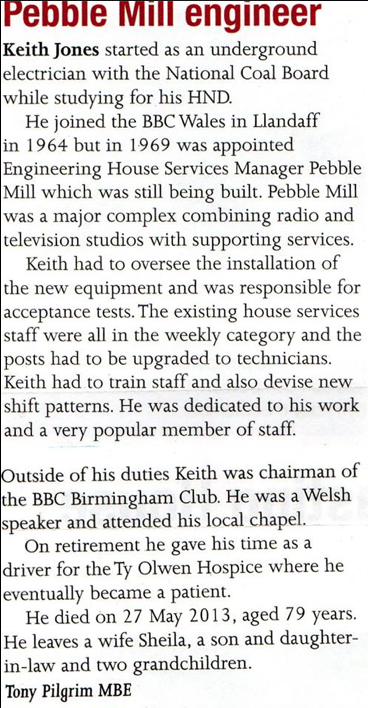The season of Remembrance brings back a terrifying experience I had when attempting to relay live the Remembrance Day Service at Queen’s Square Wolverhampton in November 1985.
We had on Radio Birmingham/WM for several years taken on the mantle of broadcasting local services as an alternative to simply re-broadcasting Radio 4 from the cenotaph in London and the Wolverhampton event had special relevance that year as the town was celebrating its Millennium.
With due attention to detail I had carried out all the essential ‘recces’ including the parking of our vehicle, the site of a suitable commentary position for myself as commentator/producer and all the relevant permissions and local arrangements with the Council and the Police. An early harbinger of challenges to come was the fact that I was issued with a parking ticket whilst actually attending a Council/Police joint planning meeting!
However come the day and I was first on parade at 0730 and thought it advisable to make early use of the Public Convenience situated under Queen’s Square. There I encountered a council cleaner and mentioned in passing if he was giving the place an extra clean ahead of the special event to be held above. His answer bothered me slightly and is registered as harbinger number two ”What special event?” he offered “ I’ve not been informed”
Next to arrive was the OB vehicle, in this case the Radio Car towing a converted caravan which had been kitted out as a fully equipped Radio Mobile control room.
Slowly over the following hours somberly dressed council officials and ladies and gentlemen of military and religious bearing made their presence known as they took up their allotted positions. I climbed the scaffolding platform where stood the Rector who would be conducting the service and confirmed my on air starting cue to him, the raising of a freshly pressed white handkerchief from my position in the crowd.
Finally Transmission time. At precisely 1045 my colleague at Pebble Mill handed over ‘Live to Pete Simpkin at Queen’s Square Wolverhampton.’ By this time as I began for me this historic broadcast harbinger number three was already rearing its ugly head. You see by now the parade of Soldiers, Veterans and local dignitaries and accompanying Brass Band was still not drawn up in front of the Rector and Civic dignitaries on their scaffolding platform. They were about 100 yards down the hill still approaching the event. I immediately launched into my Dimbleby- inspired routine using up almost all my fact cards describing the event, the location, the Regimental details of the soldiers and the veterans and by nine minutes to eleven was almost reduced to describing the shop fronts when the parade swept into the square and formed up ready for the service leading to the Two minute’s silence at 11 o’clock. At this point, as I introduced the Rector and discretely waved my cue-ing handkerchief just two of of us in that square were under pressure. How, I wondered, would the Rector condense a fifteen minute service into what by now was eight minutes and how would I respond on air…or even should I …to the shortened order?
Magnificently the Rector managed to lead what amounted to ‘a story, a hymn and a prayer’ and finish a few seconds before the 11 o’clock maroons.
And so began the Silence, what turned out to be the longest two minutes of my life. A few seconds into this a re-assuring engineer’s voice whispered quietly into my headphones “Don’t panic Pete’. By now we were beyond harbingers of doom, we were here! “ Don’t panic Pete, the Radio car is on fire!” Looking back from this distance in time I can still feel the panic which this guidance was designed to allay was palpable. With all the smoothness I could muster I very slowly turned my head without disturbing the population of Wolverhampton surrounding me to see a gentle wisp of white smoke surrounding the Radio Car. As this minor incendiary event took hold the signal level of the ‘silence’ arriving at Pebble Mill decreased to such a point that the presenter on duty in the studio felt obliged to slowly up the gain control so that at least the atmosphere of the ‘silence’ was still audible on air. Events now took a frightenly rapid turn for the worse as one of the engineers found he could by-pass the smoking component and return the signal level at base to normal. This resulted in a sudden increase in signal in my headphones so great that I feared a bomb had gone off. I winced and frantically closed my eyes fearing the worst. I knew I would have to open them again and work out how to describe the expected carnage when I realised that all the sound was in my head and around me the good burgers of Wolverhampton were still observing their silence unaware of the chaos assaulting my head. Within seconds the closing Maroons were sounding, the buglers were playing the last post and, completely on auto pilot, I was summing up and handing back to the studio.
I cannot remember getting back to The Mill and trying to describe what had happened because of course apart from a sudden lurch in sound levels during the Observation of the Silence no-one else was aware of the events that had truly been just in my ears.
Oh, as a final reward the parking ticket was personally withdrawn by the Chief Constable.
Peter Simpkin

As a post script I recall that Radio Cars were often getting into trouble. This one caught fire again somewhere near Telford and Phil Horner who was driving it had to retreat a long way to the nearest motorway phone point to summon the AA. When asked the registration number he couldn’t remember it and when the AA asked how they could identify it he cooly said,” it’s big and white, signwritten BBC Radio and it’s on fire!”
The following comments were left on the Pebble Mill Facebook group:
Michael Fisher: ‘Might add a tale about the news version of the Radio Car, the Ford estate ‘Yellow Peril’ with (new technology!) bulky mobile phone fitted (not portable!!). I used it to travel to report on a soccer match in Carlisle (v Walsall) and on my return down the M6, smoke started appearing from under the bonnet! Turned out it had not been topped up with oil. Chief engineer Stuart not impressed with my driving skills…..’
Peter Poole:’Thanks Pete, an amazing story and you kept the show on air. Service beyond the call of duty!’
Lynn Cullimore: ‘Forever the professional Pete. A lovely story…I don’t think people ever realise just how good and professional presenters and production people are!’
Pete Simpkin: ‘Thanks Lynn, actually it only works for most because we have had such great teams behind us but on this occasion there was terrible loneliness for those two very long minutes!!’




